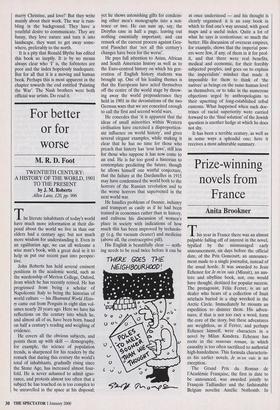For better or for worse
M. R. D. Foot
TWENTIETH CENTURY: A HISTORY OF THE WORLD, 1901 TO THE PRESENT by J. M. Roberts Allen Lane, £20, pp. 906 The literate inhabitants of today's world have much more information at their dis- posal about- the world we live in than our elders had a century ago; but not much more wisdom for understanding it. Even in an egalitarian age, we can all welcome a wise man's book, with a great deal in it to help us put our recent past into perspec- tive.
John Roberts has held several eminent positions in the academic world, such as the wardenship of Merton College, Oxford, from which he has recently retired. He has progressed from being a scholar of Napoleonic Italy to being the historian of world culture — his Illustrated World Histo- ry came out from Penguin in eight slim vol- umes nearly 20 years ago. Here we have his reflections on the century into which he, and almost all of us, have been born, based on half a century's reading and weighing of evidence.
He covers all the obvious subjects, and points them up with skill — demography, for example, the science of population trends, is sharpened for his readers by the remark that during this century the world's total of inhabitants, gradually rising since the Stone Age, has increased almost four- fold. He is never ashamed to admit igno- rance, and protests almost too often that a subject he has touched on is too complex to be unravelled in the space at his disposal; yet he shows astonishing gifts for condens- ing other men's monographs into a sen- tence or two. He can sum up, say, the Dreyfus case in half a page, leaving out nothing essentially important; and can remark of the current process against Gen- eral Pinochet that 'not all this century's changes have been for the worse'.
He pays full attention to Asian, African and South American history as well as to the Euro-centred history on which his gen- eration of English history students was brought up. One of his leading themes is that the Europeans have acted themselves off the centre of the world stage by throw- ing away the world preponderance they held in 1901 in the devastations of the two German wars that we are conceited enough to call the first and second world wars.
He concedes that 'it is apparent that the ideas of small minorities within Western civilisation have exercised a disproportion- ate influence on world history', and gives several elegant examples, while making it clear that he has no time for those who preach that history has 'iron laws', still less for those who suppose it has now come to an end. He is far too good a historian to contemplate predicting the future, though he allows himself one wistful conjecture, that the failure at the Dardanelles in 1915 may have condemned the world both to the horrors of the Russian revolution and to the worse horrors that supervened in the next world war.
He handles problems of finance, industry and transport as easily as if he had been trained in economics rather than in history, and enlivens his discussion of women's place in society with indications of how much this has been improved by technolo- gy (e.g. the vacuum cleaner) and medicine (above all, the contraceptive pill).
His English is beautifully clear — noth- ing needs to be read twice before it can be at once understood — and his thought is clearly organised: it is an easy book in which to find one's way around, with good maps and a useful index. Quite a lot of what he says is contentious: so much the better. His discussion of overseas empires, for example, shows that the imperial pow- ers were few, if any, of them in it for prof- it, and that there were real benefits, medical and economic, for their forcibly subjected peoples, and goes on to explain the imperialists' mindset that made it impossible for them to think of 'the natives' as beings on the same human level as themselves, or to take in the numerous objections urged by anthropologists to their upsetting of long-established tribal customs. What happened when such doc- trines of racial superiority were carried forward to the 'final solution' of the Jewish question is another hedge at which he does not shy.
It has been a terrible century, as well as in some ways a splendid one; here it receives a most admirable summary.


















































 Previous page
Previous page